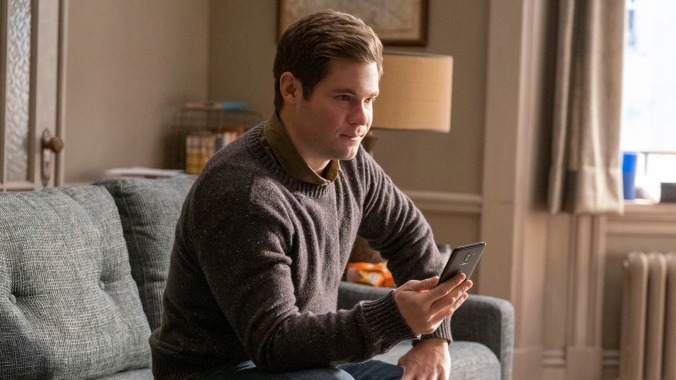Okay, Jexi: Find a funnier comedy


Imagine an episode of Black Mirror written and directed by Jon Lucas and Scott Moore, the minds behind such piercing social commentaries as The Hangover, Bad Moms, and Office Christmas Party. Jexi, their latest, Adam DeVine-fronted jaunt, examines how people who live in a society are addicted to their phones, man. We’d rather stare at our screens crafting perfect Instagram posts than live life like genuinely happy, bike-riding, party-going, sex-having human beings. The modern condition is grim, and it spawns unsocialized losers like DeVine’s Phil, who for reasons never made clear, audiences should pity enough to be interested in his redemption. Surely, bland cultural insights can’t defeat a film whose main attraction is the promise of stupid, raunchy fun? Reader, Jexi fails even at that, as it awkwardly struggles across its slim running time to land a single one of its existentially painful, seemingly bot-generated jokes.
Get this: Journalism has been reduced to the brainless task of producing inane click bait, and serious writers are condemned to creating lists like “12 cats that look like Ryan Gosling.” That’s the dystopian reality inhabited by tortured media-company employee Phil, who self-medicates with a lonely ritual of porn and Chinese food in the womblike comfort of his San Francisco apartment. An opening scene traces Phil’s phone-obsessive behavior to his childhood, back when he buried himself in the gadget’s delights as a distraction from his parents’ crumbling marriage. In the present day, he continues this means of escape, preferring the comparatively safe spaces of social media to the risk of making a fool of himself in real-life interactions. Tragedy strikes during a meet-cute with free-spirited bike shop owner Kate (Alexandra Shipp), which ends with Phil’s beloved Siri shattered to bits. Thus arrives a new companion, Jexi, voiced indistinguishably by Rose Byrne—an updated program who claims she’s here “to make [his] life better.”
Unlike the warm, sensitive disembodied girlfriend of Spike Jonze’s Her, Jexi turns out to be bitchy, raunchy, and foul-mouthed, though she does manage to bully Phil into growing a spine and seizing the day, as it were. Because Phil, like most of us, mindlessly accepts Jexi’s user agreement, and a defect allows her to manifest in whatever device is connected to the “cloud,” Jexi is practically autonomous and all-powerful to act as she sees fit for Phil’s sake. And her abuse yields results. Phil lands a promotion at work and begins a tenuous romance with Kate, all thanks to Jexi’s tough-love coaching, which brings man and phone into a particularly intimate relationship: Jexi is Phil’s best friend, his confidante, his North Star. But just as things start to look up, her feelings for Phil develop into something much creepier. And when Phil begins to take less of an interest in his phone while he’s out “living his best life,” the slighted Jexi reacts like a crazy ex-girlfriend version of HAL 9000.
In a media landscape populated by too many offensively unfunny white men, there’s something at least mildly refreshing about DeVine’s tyke-ish physicality and willingness to poke fun at the anxieties of small, doughy men that over-compensate for their perceived inadequacies in ridiculous ways. Here, he comes off as clueless and cowardly enough to be charming, even if he’s not an entirely convincing introvert. But paired off with the AI simulation of a teenage mean girl, DeVine isn’t really asked to be a comedian, just a victim and a lousy rom-com protagonist. Jexi spends most of her time reminding Phil how much of an “unfuckable” idiot he is, which quickly grows as old as a game of “yo momma” jokes—it’s the verbal equivalent of tripping, slapping, and pushing the clown for some laughs. Maybe Jexi’s software isn’t programmed for insults, even if it is highly cognizant of her human’s incompetence.
Beyond dated commentary on the relationship between humans and technology, Jexi’s ultimate tragedy is its utter lack of imagination. For all its pokes at internet culture—the absurdity of adults who “floss,” the politics behind sexting—the film feels like a simulation, an expression of a millennial zeitgeist assembled by a computer sometime last decade. Even with small appearances by Wanda Sykes as a skeptical salesperson and a particularly energetic Michael Peña as Phil’s abrasive supervisor, each exchange is so painfully dim and half-baked, you’ll find yourself holding your breath in hopes that the next line might work. As technologies take command of more and more facets of our lives, related storytelling fodder is far from exhausted. Yet Lucas and Moore seem to think that a computer well-versed in trends and modern sex is bold and provocative enough to merit our attentions. Their shtick isn’t any fresher than talking dogs or bad santas.